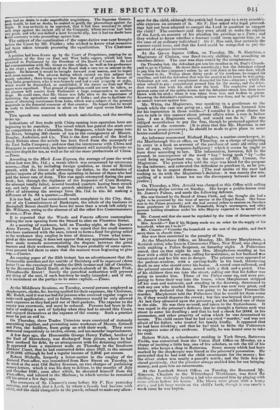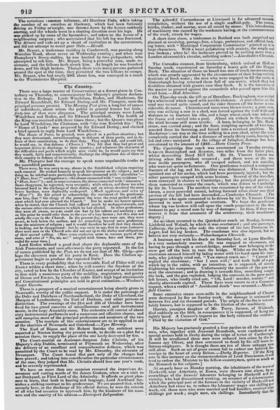At the Middlesex Sessions, on Tuesday, several persons employed as
shopkeepers, clerks, Szc. having applied for their expenses, the Chairman, Mr. Rotch, said it was too bad for persons who received regular wages to make such application; and in future, witnesses would be only allowed such expenses as they had paid out of their pockets. The expense to the county was enormous, and must be reduced. Persons had been in the habit of making a sort of holyday when they had to attend this Court, and enjoyed themselves at the expense of the county. Such a practice must be put an end to.
On Thursday, three Trades Unionists were convicted of riotously assembling together, and preventing some workmen of Messrs. Grissell and Peto, the builders, from going on with their work. They were sentenced respectively to twelve, eleven, and ten months' imprisonment.
A few days ago, the Honourable George Henry Talbot, brother of the Earl of Shrewsbury, was discharged from prison, where be had been confined for debt, by an arrangement with his detaining creditor. It appeared from a statement made on Thursday in the Insolvent Debtors' Court, that he had contracted debts since 1827, to the amount of 28,000/. although he had a regular income of 3,204/. per annum.
Robert Nicholls, formerly a letter-carrier in the employ of the General Post-office, was 'committed from Bow Street on Tuesday, to be tried at the next Old Bailey Sessions, on two charges of purloining money-letters, which it was his duty to deliver, in the months of July and October 1830; soon after which, he absented himself from the P.ost:office, and inlisted in the Marines; in which -service he remained till his arrest a few days ago. The overseers of SL Clement's came before Sir F. Roc yesterday morning, and stated, that a Lord, by whom a female had become with child, and the child chargeable to the parish, refused to make any allow- ance for the child, although the parish had been put to a very consider- able expense on account of it. Sir F. Roe asked why legal proceed- ings had not been adopted to compel the Lord in question to support the child? The overseers said they were afraid to make the caption of the Lord, on account of his pleading his privilege as a Peer ; and they wished to know whether a warrant could issue against him, as in the case of an ordinary individual ? Sir F. Roe said, that certainly the warrant could issue, and that the Lord could be compelled to pay the ainouut of expense incurred.
At the Queen Square Office, on Tuesday, Mr. N. Hutchins, a Magistrate of Chelsea, was fined twenty shillings, for assaulting an omnibus-driver. The case was thus stated by the complainant— On Thursday last, the defendant got into his omnibus in St. Paul's Church- yard to go to Chelsea. He drove there accordingly ; but the defendant refused to pay him his fare (sixpence) unless he set him down at his own door, which he refused to do. Within about thirty yards of his residence, he stopped his omnibus, and told the defendant that was the aearest to his house be was going. Defendant got out, and complainant demanded his fare—sixpence; which the other refused to pay : complainant pressed him for the money, and the defen- dant struck him with Ins stick over the head. The conductor and other parsons came out of the public-house, and the defendant struck him three more blows with his stick ; when it was taken from him and broken to pieces. Knowing the defendant's residence, nothing more was done, and he applied for an assault warrant against him.
Mr. White, the Magistrate, was speaking to a gentleman on the bench while the case was going on ; and Mr. Hutchins lectured him for his inattention in these words—" I consider it a great shame for you to talk in this manner about private affairs when a case is before you. I am a Magistrate myself, and would not do it." He was obliged nevertheless to pay the fine, though he protested against the injustice of the sentence. [It is plain that this Mr. Hutchins is not fit to be a peace-preserver; he should be made to give place to some better-conducted person.]
An informer summoned Richard Hughes, a marine-storekeeper, to the Marlborough Street office, on Thursday, on a charge of neglecting to enter in a book an account of the purchase of some old string and bits of rope, value twopence-halfpenny ! which it seems he ought to have done according to law. The information, however, fell to the ground, in consequence of the word " buy " being spelt "by "—the word being an important one, in the opinion of Mr. Conant, the Magistrate. The person who sold the rope was hired for the purpose by the informer, and entreated the defendant to purchase it, as he pre- tended to be in urgent distress. [The real merits of the case had nothing to do with the Magistrate's decision : it was merely the mis- spelling of a word: hence we see the discrepancy between law and justice.) On Thursday, a Mrs. Arnold was charged at this Office with selling beer during divine service on Sunday. She keeps a public-house near St. James's Palace, and made the following defence.
She was licensed by the Board of Green Cloth, and she thought she had a right to be governed by the time of service at the Chapel Royal. Her house was in the Palace precincts; and she had several orders to execute on Sundays from gentlemen of his Majesty's Household, King's messengers, and other persons holding situations under his who Majesty expected to be served at all times. Mr. Conant said that she must be regulated by the time of divine service at St. James's Church.
Mrs. Arnold—" But if his Majesty sends me an order for the supply of Lis household, what am I to do?" Mr. Conant—" Consider the household as the rest...of the public, and don't serve them in church time."
She was then convicted in the penalty of 10s.
At the Marylebone Office, on Monday, Mr. Henry Macpherson, a Scottish artist, who lives in Cirencester Place, New Road, was charged with stabbing a Police Sergeant, on Saturday night. A Policeman stated, that on that night he saw Mrs. Macpherson standing at her door with a child in her arms, calling for assistance, as her husband was intoxicated and her life was in danger. The prisoner soon appeared at the parlour-window, with a carving-knife in his hand, threatening death to any who should enter his house. A crowd soon collected, and the prisoner opened the door, armed with a dirk and a pistol. One of his children then ran into the street, calling out that his father was going to murder him. Three of the Police came up. and were pre- paring to force their way into the house, when Macpherson stripped off his coat and waistcoat, and standing in the doorway, threatened to stab any one who touched him. The crowd was now very great, and the people declared that there was going to be another Pentonville murder. Macpherson told the Policemen that he would let them come in if they would disperse the crowd ; but this was beyond their power. Al last they advanced upon the prisoner ; and he stabbed one of them in the side. He was then secured, and taken to the Stationhouse. It was urged in the prisoner's defence, that he thought a furious mob was about to enter his dwelling ; and that he had a check for 2000/. in his possession, and other property of value which he was determined to secure. The child swore that he had not cried "murder," and was not afraid of his father, who treated his family kindly. It appeared that he had been drinking ; and that he her tried to bribe the Policemen to suppress some of the evidence. Finally, he was bound over to take his trial.
Robert Welch, a schoolmaster residing in York Street, Battersea Fields, was committed from the Union Hall Office on Monday, on a charge of inciting a little boy, one of his scholars, to rob the till of his father, who keeps a shop in Battersea. Some money which had been marked by the shopkeeper was found in the prisoner's possession. He pretended that he had sold the child sweetmeats for the money ; but the silver stolen was nearly a pound's worth ; and the little boy de- clared positively, that the prisoner always scolded him for not bringing money, and gave him no sweetmeats.
At the Lambeth Street Office, on Tuesday, the Reverend Mr. Simpson, Chaplain to the Whitechapel Workhouse, was fined ttn shillings, for violently beating a lad who annoyed him by playing with some others before his house. The blows were given with a heavy stick ; and left large weals on the child's back, though it was nearly a week since he was beaten. The notorious common informer, old Matthew Hale, while taking the number of an omnibus at Hackney, which had been furiously driving on Friday se'nnight, was thrown down by the horses suddenly starting, and the wheels went in a slanting direction over his legs. He was picked up by some of the bystanders, and taken to the house of a neighbouring surgeon ; who ascertained that his left leg was fractured. The drivers and cads set up a shout of exultation at the occurrrence, and did not attempt to assist poor Hale. —Her.ald.
Mr. Bryant, a tradesman residing in Camberwell, was passing along Waterloo Road, about seven on Wednesday evening ; and when near Humphrey's livery-stables, he was hustled by two pickpockets, who attempted to rob him. Mr. Bryant, being a powerful man, made re- sistance, and the fellows both struck him. At length he was knocked down, and his thigh broken. Though there were many persons gathered around the spot at the time, they permitted the two fellows to escape. Mr. Bryant, who had nearly 2001. about him, was conveyed in a coach to the Westminster Hospital.























 Previous page
Previous page